Three stories about Europe from Davos
Ralitsa Kovacheva, February 1, 2011
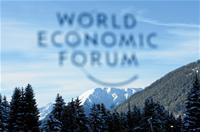 What Europe should do with itself and with the world around it? European leaders are facing a severe battle with debts and deficits, while the EU is losing its competitiveness and its influence abroad. Its economic growth is slower than expected - for 2011 growth in the euro area is projected to be 2% below the global average. Against this background, it was curious to see the problem through the eyes of three European leaders who attended the annual meeting of the World Economic Forum in Davos.
What Europe should do with itself and with the world around it? European leaders are facing a severe battle with debts and deficits, while the EU is losing its competitiveness and its influence abroad. Its economic growth is slower than expected - for 2011 growth in the euro area is projected to be 2% below the global average. Against this background, it was curious to see the problem through the eyes of three European leaders who attended the annual meeting of the World Economic Forum in Davos.
David Cameron – the optimist, perhaps because he is a prime minister of a 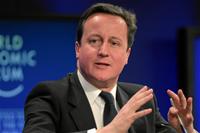 country that not only is not a member of the eurozone, but does not want to be. According to the British Prime Minister, this is what pessimists say about the future of Europe:
country that not only is not a member of the eurozone, but does not want to be. According to the British Prime Minister, this is what pessimists say about the future of Europe:
We, in Europe, are incapable of solving our debt and deficit problems.
We’re unable to compete with dynamic economies because we’ll always be over-burdened with regulation and bureaucracy.
We’re hardwired to be consumers and not producers.
We’re attached to liberal values that are leaving us far behind the juggernaut of authoritarian capitalism.
David Cameron, however, delivered quite the opposite message in Davos: “Today, I want to make the case for optimism – for confidence in our future. We can overcome these problems but we do need a change of direction. Huge deficits don’t just fall out of the sky.”
Our problems result from our own decisions, Mr Cameron said: "In many ways, we in Europe have been our own worst enemy.” But that is exactly why we have the power to make necessary changes, and our first task is to get rid of the huge government debts. The British Prime Minister indicated that the average level of indebtedness in the EU was 80% of GDP. This year, some countries will still borrow 5%, 6% or 7% of GDP, and the UK - 10%. This cannot go on like this, he stated.
It is exactly the course to reducing budget deficit that has given the markets the needed confidence in the United Kingdom, the Prime Minister underlined. So the country’s credit rating, which has been threatened by a decline, remained at the triple A level, and interest rates began to fall.
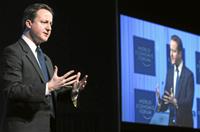 Together with the stabilisation of public finances, Europe needs to reform its financial system and to strengthen the banks. David Cameron sharply criticised the 2010 stress tests: ”They said we were three and a half billion euros short – then six months down the line Irish banks alone needed ten times that”. Therefore, he said, the new stress tests, which have to be conducted during the first half of this year, should be tougher, should cover a three-year period in terms of liquidity and capital and to involve independent bodies like the IMF.
Together with the stabilisation of public finances, Europe needs to reform its financial system and to strengthen the banks. David Cameron sharply criticised the 2010 stress tests: ”They said we were three and a half billion euros short – then six months down the line Irish banks alone needed ten times that”. Therefore, he said, the new stress tests, which have to be conducted during the first half of this year, should be tougher, should cover a three-year period in terms of liquidity and capital and to involve independent bodies like the IMF.
To prosper, Europe must reduce bureaucratic and regulatory burden and to encourage business and innovation. And very important: “to go for a genuine single market”. And outside, in world trade, Europe should not be cautious, but rather be active and even aggressive. The Doha Round negotiations should continue, but with no more stubbornness, with no offers, hidden in the back pocket, everybody should make concessions, David Cameron said. "For many leaders the export is a success and the import is a failure - we must get rid of this thinking.”
And very important – we have to restore confidence in our liberal values. “Now some people are doubting it. They’ve seen authoritarian capitalism and the way it works”, Mr Cameron explained, our liberal values seem outdated and ineffective, even an obstacle to success. “I passionately disagree”, British Prime Minister exclaimed, adding that "it’s these values that create the climate for innovation", because “good ideas come through freedom – free thinking and the free association of like-minded people.”
Versus Cameron, the optimist, Greek Prime Minister Georgios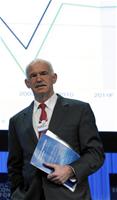 Papandreou sounded rather disappointed and perhaps tired. He is probably the European leader with the most bitter election victory in recent years. Coming to power in 2009, Mr Papandreou inherited 15% budget deficit, 300 billion euro of government debt, a totally destroyed image of the country after it emerged that it had forged its fiscal statistics for years, distrust and prohibitive interest rates by financial markets. As a result, Greece was "rescued" by a loan from the EU and the IMF, but the expectations for a forthcoming bankruptcy were growing.
Papandreou sounded rather disappointed and perhaps tired. He is probably the European leader with the most bitter election victory in recent years. Coming to power in 2009, Mr Papandreou inherited 15% budget deficit, 300 billion euro of government debt, a totally destroyed image of the country after it emerged that it had forged its fiscal statistics for years, distrust and prohibitive interest rates by financial markets. As a result, Greece was "rescued" by a loan from the EU and the IMF, but the expectations for a forthcoming bankruptcy were growing.
However, Georgios Papandreou told a story, completely opposite to that of David Cameron's
Last year we reduced the deficit by 6%, we are conducting serious reforms – of the pension system, of the tax system, of the local authorities and central government, the Greek Prime Minister told the audience. Nevertheless, he admitted “last year the question was would Greece default. This year the question is again will Greece default. We did everything by the book.We followed the recipe, but the markets haven’t responded”.
The butterfly effect applies also to the financial markets, he explained, a slight flap of wings in one part of the world is causing a storm in another. Greece is protected by the European mechanism (EFSM, which has been created because of Greece in May last year), but this is not enough. “The major challenge for Europe today is to develop a model for governance which is sustainable”, Mr Papandreou said, naming the euro area rescue fund as a big step in that direction. However, "it should be robust and flexible enough to intervene and help”. The Greek Prime Minister's statement can be interpreted as a support to the increasing of the size and functions of the fund, although he explicitly stressed that it was still under discussion. Papandreou mentioned several times the Eurobonds, as an idea which was standing in front of the EU in the future.
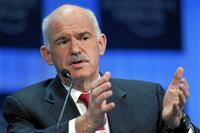 The Greek Prime Minister, however, made a very strong recognition: "The Greek problem is not a debt problem, it is a problem of governance”. Perhaps Georgios Papandreou understands the meaning of these words better than any other European leader. Because he is bearing on his own back the consequences of governance or rather – the lack of governance for years. And here is hidden the answer of his question why markets do not appreciate Greece's effort, as, for example, UK's. In this situation, the very best of what Greece can count on is the solidarity in the European Union.
The Greek Prime Minister, however, made a very strong recognition: "The Greek problem is not a debt problem, it is a problem of governance”. Perhaps Georgios Papandreou understands the meaning of these words better than any other European leader. Because he is bearing on his own back the consequences of governance or rather – the lack of governance for years. And here is hidden the answer of his question why markets do not appreciate Greece's effort, as, for example, UK's. In this situation, the very best of what Greece can count on is the solidarity in the European Union.
Solidarity, however, is not for granted, it must be accompanied by the implementation of harsh conditions, German Chancellor Angela Merkel warned. Namely she was Papandreou's biggest nightmare and, at the same time, Greece’s most generous savior last year.
In contrast to Cameron’s optimism, Angela Merkel spoke from the position of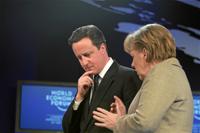 healthy scepticism. Ms Merkel sounded not so much as the chancellor of Germany but rather as a leader of the EU. Significantly, she began her speech with EU's relations with the outside world, and not as it could have been expected - with domestic issues.
healthy scepticism. Ms Merkel sounded not so much as the chancellor of Germany but rather as a leader of the EU. Significantly, she began her speech with EU's relations with the outside world, and not as it could have been expected - with domestic issues.
“But can we safely say that we can prevent further crises from happening? Do we have the necessary mechanisms in place to ensure sustainable growth globally? We have laid down the groundwork, but we are not there yet. What we have done is not yet sufficient”, Angela Merkel warned. The danger comes from the complacence, because the crisis is no longer a headline in the media and the international community, including the G20, is losing a sense of urgency.
Ms Merkel reiterated that the coordination of national responses to the crisis was still not sufficient. We need more regulation, because “every financial player has to be made subordinate to supervision”. In this sense, she emphasized that the French presidency of the G20 marked the transition from the crisis mode to a stage, where the world needed to learn to work together.
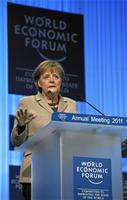 From this moment on the Chancellor repeated almost verbatim the key messages of the French President, Nicolas Sarkozy, who spoke at the forum a day earlier. She highlighted three areas where collaboration should be focused on: currencies, global trade and commodity prices.
From this moment on the Chancellor repeated almost verbatim the key messages of the French President, Nicolas Sarkozy, who spoke at the forum a day earlier. She highlighted three areas where collaboration should be focused on: currencies, global trade and commodity prices.
In her words, the exchange rates should reflect the fundamental data of individual countries, and “imbalances are not allowed to play themselves out unrestrained”. The German Chancellor once again sharply criticised the protectionist policies and, like David Cameron, called for the Doha round negotiations to be completed quickly: “We are literally metres away from the finishing line. But if we do not reach it, then decades will go by without this opportunity offering itself again”. Like President Sarkozy, Chancellor Merkel drew attention to the need for transparency and fair access to commodities.
As for Europe, Angela Merkel was again clear and in full harmony with Mr 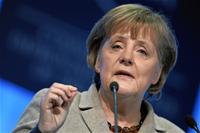 Sarkozy: “We now have a clear crisis of indebtedness. But let me tell you, there is no crisis of the euro as such.” The euro is our currency and it is more than currency, she stated, “It is the embodiment of Europe today. Should the euro fail, Europe will fail. We are going to defend the euro”, Angela Merkel said categorically.
Sarkozy: “We now have a clear crisis of indebtedness. But let me tell you, there is no crisis of the euro as such.” The euro is our currency and it is more than currency, she stated, “It is the embodiment of Europe today. Should the euro fail, Europe will fail. We are going to defend the euro”, Angela Merkel said categorically.
Currently the biggest problem of the EU is its competitiveness – both within the Union, and especially in the euro area, and of the EU at large at the global stage. Therefore, we must work for more coordination, both economic and political, Ms Merkel said, giving as an example the social systems. Germany is ready to show solidarity, but supported by budgetary stringency and soundness. “Solidarity and competitiveness are two sides of same coin”, German Chancellor noted.
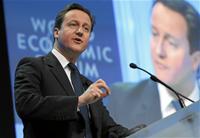 Instead of a summary, I will conclude with David Cameron's response to a question from the audience, whether his vision for Europe's development was shared across the EU. I'm very enthusiastic, the British Prime Minister replied, when I look at Mark Rutte in Holland, Fredrik Reinfeldt in Sweden, French President Nicolas Sarkozy or German Chancellor Angela Merkel, because we have common visions. Mr Cameron also recalled the Summit of Nordic and Baltic countries, recently held in London.
Instead of a summary, I will conclude with David Cameron's response to a question from the audience, whether his vision for Europe's development was shared across the EU. I'm very enthusiastic, the British Prime Minister replied, when I look at Mark Rutte in Holland, Fredrik Reinfeldt in Sweden, French President Nicolas Sarkozy or German Chancellor Angela Merkel, because we have common visions. Mr Cameron also recalled the Summit of Nordic and Baltic countries, recently held in London.
 As a citizen of a country which is too south of the above mentioned nations, I felt isolated. The picture of a European Union divided into a prosperous North and a distressed South is becoming more real. At least David Cameron, although he hardly had exactly this in mind, described it very clearly. And I, like probably millions of Europeans, want my leaders to be part of this “elite”, to share its visions for the future of the EU, to take part in the decision-making and common actions. And very important: to share its values. In the name of that freedom, described by the British Prime Minister: freedom to create, to grow and to be among people who want the same.
As a citizen of a country which is too south of the above mentioned nations, I felt isolated. The picture of a European Union divided into a prosperous North and a distressed South is becoming more real. At least David Cameron, although he hardly had exactly this in mind, described it very clearly. And I, like probably millions of Europeans, want my leaders to be part of this “elite”, to share its visions for the future of the EU, to take part in the decision-making and common actions. And very important: to share its values. In the name of that freedom, described by the British Prime Minister: freedom to create, to grow and to be among people who want the same.
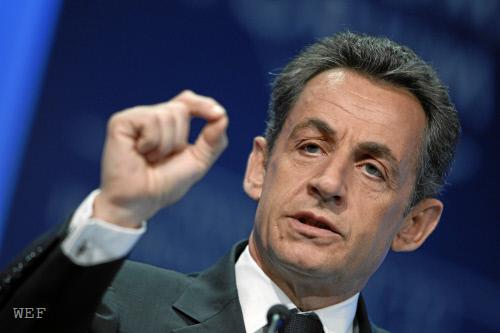 | © WEF
| © WEF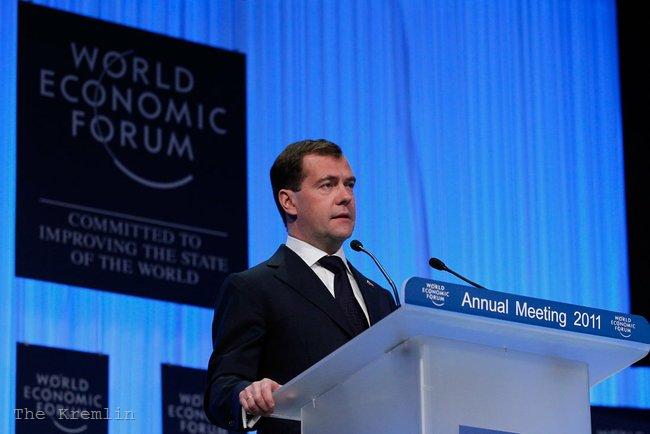 | © The Kremlin
| © The Kremlin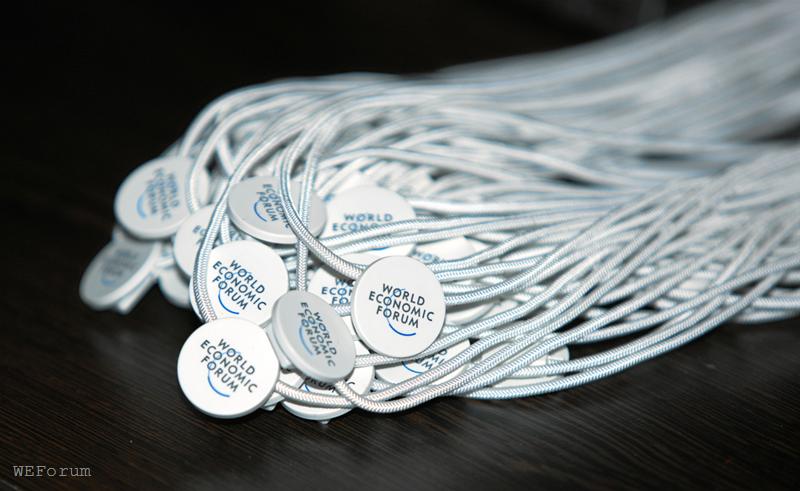 | © WEForum
| © WEForum